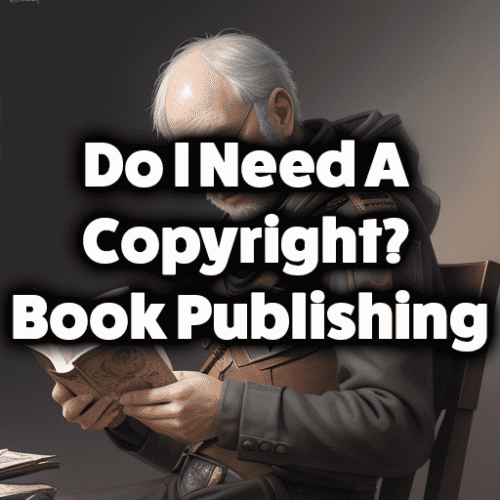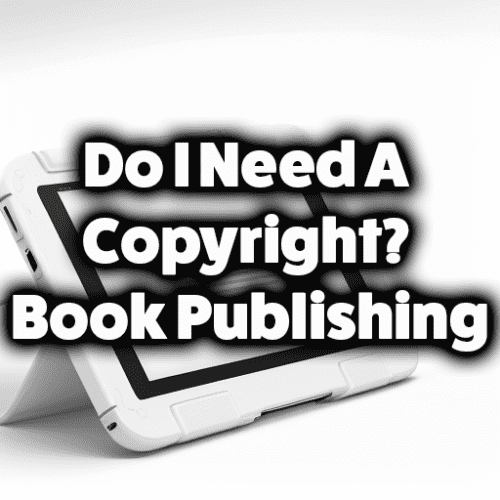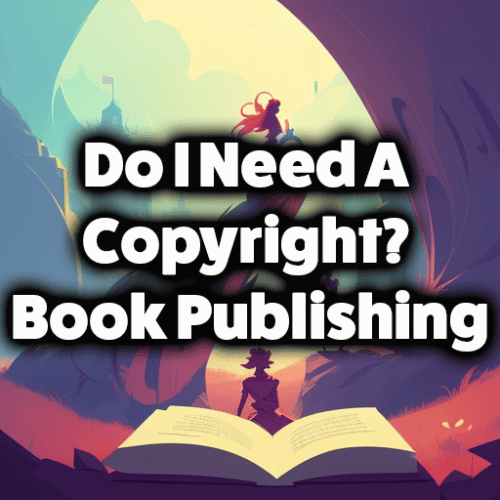Do I Need A Copyright? Book Publishing
Do I Need A Copyright? Book Publishing. Before launching into our in-depth exploration of copyrights, let’s pause for a moment and consider a hypothetical scenario. Imagine pouring countless hours into creating a unique, original work, only to discover someone else profiting from it without your permission or even a simple acknowledgment. Frustrating, isn’t it? This is why understanding copyright laws and asking the pivotal question, “Do I need a copyright?” is essential. Let’s embark on this intellectual journey with EditMojo.com as our guiding compass.
Key Takeaways
| Key Points | Details |
|---|---|
| What is Copyright? | Copyright is a form of intellectual property law that protects original works of authorship including written works, music, and artwork. |
| Importance of Copyright | Copyright laws prevent plagiarism and unauthorized use of original work, protect the financial interests of creators, and encourage creativity and innovation. |
| Need for Copyright | Copyright is needed when original work is created, especially if it has commercial potential or is intended for public display. |
| Automatic Copyright Protection | Copyright protection is automatic once an original work is created. However, formal copyright registration provides more robust legal protection. |
| Copyright Registration Process | Copyright registration involves filing an application with the copyright office, paying a fee, and depositing a copy of the work. |
| Role of EditMojo.com | EditMojo.com offers services that can assist in content creation and copyright protection, providing guidance in navigating copyright laws. |
| International Copyright Considerations | The Berne Convention ensures that a copyright registered in one country is respected in all other signatory countries, but specific laws can vary by country. |
| Common Copyright Myths | Myths include the belief that works without a copyright symbol are free to use, and misunderstandings around the concept of ‘fair use’. |
What Is Copyright?
The word ‘Copyright’ often conjures up images of stern warnings at the start of movies or the small © symbol at the bottom of websites. But what exactly is it? In layman’s terms, copyright is a form of intellectual property law that protects original works of authorship such as written works, music, and artwork, from being used without the creator’s permission[^1^]. From the moment you pen an original idea or produce a piece of music, copyright laws swing into action, acting as an invisible shield around your creation.

Basic Principles and Concepts
Unlike tangible property, intellectual property is immaterial, making it subject to different principles and concepts. These principles are not new. In fact, they trace their roots back to the Statute of Anne, an English law enacted in 1709 that first recognized the author’s rights to their creation[^2^]. Fast forward to today, and copyright has evolved into a complex system, but the essence remains the same: protecting and rewarding creativity.
The Importance of Copyright
Let’s use a comparison to explain the importance of copyright. Picture your original work as a golden goose, continuously laying golden eggs of potential profit and recognition. Without copyright protection, anyone could snatch away your golden goose, leaving you empty-handed. Copyright serves as a legal fence, ensuring that the fruits of your hard work land in your pocket, not someone else’s.
Encouraging Creativity and Innovation
Copyright not only protects, but it also encourages creativity and innovation. Think of it as society’s way of saying, “We value your original ideas, and we’ll reward you for them!” This assurance fuels the engines of creativity, sparking new ideas, and birthing innovations that enrich our world.

Do I Need a Copyright?
Having defined copyright and underscored its importance, let’s circle back to the keyword question: “Do I need a copyright?” The answer to this question isn’t a simple yes or no. It’s nuanced, varying based on several factors.
When You Need a Copyright
For instance, if you’re an artist creating original paintings, a writer weaving stories, or a musician composing tunes, you certainly need copyright protection. The moment your ideas materialize into tangible form, they are automatically protected. However, if you intend to publish your work, display it publicly, or if it has commercial value or potential, it’s recommended to formally register your copyright for added protection.
Take J.K. Rowling, for instance. When she wrote the Harry Potter series, the stories were automatically copyrighted. But by registering her copyright, she had solid legal footing to sue when her works were plagiarized[^3^].
When You Might Not Need a Copyright
Conversely, there are situations when you might not need a copyright. Works in the public domain, facts, ideas, or utilitarian goods aren’t copyrightable. For instance, Shakespeare’s plays aren’t copyrighted because they are in the public domain. Similarly, you can’t copyright the idea for a novel about a wizard school – it’s the
unique expression of that idea in the form of Harry Potter that’s protected.
Understanding Automatic Copyright Protection
As mentioned before, copyright protection kicks in the moment an original work is created. This is known as automatic copyright protection, and it’s a wonderful aspect of copyright law because it protects your work from the get-go.
However, relying solely on automatic copyright protection can be like venturing into a storm with just an umbrella. It offers some protection, but it might not be enough when the legal winds blow hard. Registering your copyright provides a concrete record, making it easier to prove your ownership in court if someone infringes upon your rights[^4^].
The Process of Copyright Registration
So, how do you register a copyright? It involves filing an application with the copyright office, paying a fee, and depositing a copy of the work. Although it might seem like a hassle, the benefits outweigh the effort. Registering your copyright provides a public record of your claim, allowing you to seek statutory damages and attorney fees in court if your work is infringed.

How EditMojo.com Can Help with Your Copyright Needs
At this point, the whole copyright process might seem overwhelming. But fret not, because EditMojo.com is here to help. Offering a range of services, EditMojo.com can assist in content creation while ensuring that your work is well-protected. Many clients have benefitted from their expertise. They’re like the sherpa guiding you up the Everest of copyright laws, making the journey smoother and safer.
International Copyright Considerations (Do I Need A Copyright? Book Publishing)
With the Internet shrinking the world into a global village, it’s crucial to understand international copyright laws. The Berne Convention, an international agreement, ensures that a copyright registered in one country is respected in all other signatory countries[^5^]. However, copyright laws can vary significantly by country. Navigating this maze can be complex, but with proper guidance and resources, you can ensure your work is protected, no matter where it’s displayed.
Common Myths and Misunderstandings About Copyright
Let’s bust some common myths about copyright. For instance, many believe that if a work doesn’t display a copyright symbol, it’s free to use. That’s a misconception. Since the Berne Convention, the use of the copyright symbol is optional[^6^]. Another myth revolves around the concept of ‘fair use,’ which allows limited use of copyrighted material under certain conditions. However, what constitutes ‘fair use’ is often misunderstood and can lead to unintentional infringements.
Conclusion (Do I Need A Copyright? Book Publishing)
In wrapping up our discussion, it’s clear that understanding and securing copyright protection is essential in safeguarding your original work. So, next time you ask yourself, “Do I need a copyright?” remember what’s at stake – your creative expression, hard work, potential profits, and even your reputation. To navigate the labyrinth of copyright laws, resources like EditMojo.com can be a great companion, providing expertise and assistance in ensuring your intellectual property rights are well-protected.
Call to Action (Do I Need A Copyright? Book Publishing)
Whether you’re a budding author, an aspiring artist, or a music enthusiast with a knack for composition, take a step toward understanding and protecting your copyrights today. Check out EditMojo.com to explore their services, and don’t hesitate to share this post with others who might find it helpful.
Knowledge is power, and when it comes to copyrights, it’s also protection.
[^1^]: Copyright Basics
[^2^]: Statute of Anne: The First Copyright Statute
[^3^]: J.K. Rowling wins copyright claim
[^4^]: The Advantages of Copyright Registration
[^5^]: Berne Convention
[^6^]: Berne Convention and the Universal Copyright Convention
Top Five Questions and Answers (Do I Need A Copyright? Book Publishing)
| Questions | Answers |
|---|---|
| Do I need a copyright for my work? | If your work is original and has potential commercial value, or if you plan to publicly display it, you should consider copyright protection. |
| How can I register my copyright? | You can register your copyright by filing an application with the copyright office, paying a fee, and depositing a copy of your work. |
| What is the role of EditMojo.com in copyright protection? | EditMojo.com offers services that assist in content creation and ensuring copyright protection, guiding you through the complexities of copyright laws. |
| Is my copyright protected internationally? | The Berne Convention ensures that a copyright registered in one country is respected in all other signatory countries. However, specific copyright laws can vary by country. |
| Are works without a copyright symbol free to use? | No, since the Berne Convention, the use of the copyright symbol has been made optional. Even without the symbol, original works are still protected by copyright laws. |
Top Ten Resources and Further Reading
Interactive Quiz: Do You Know Your Copyrights?
- What is Copyright?
A. A license to use someone else’s work
B. A type of intellectual property law protecting original works
C. A form of insurance for tangible property
D. A trademark for businesses - When does Automatic Copyright Protection apply?
A. When the work is registered with the copyright office
B. When the work is published
C. The moment an original work is created
D. After one year of the work’s creation - Which of the following cannot be copyrighted?
A. An original novel
B. A unique piece of music
C. An idea for a book
D. A painting - What is the Berne Convention?
A. A science convention
B. An international agreement governing copyright
C. A treaty related to trademark laws
D. A historical event - How can EditMojo.com help with your copyright needs?
A. By providing legal representation
B. By offering services related to content creation and copyright protection
C. By publishing your work
D. By issuing copyright certificates
Answers:
1-B, 2-C, 3-C, 4-B, 5-B
